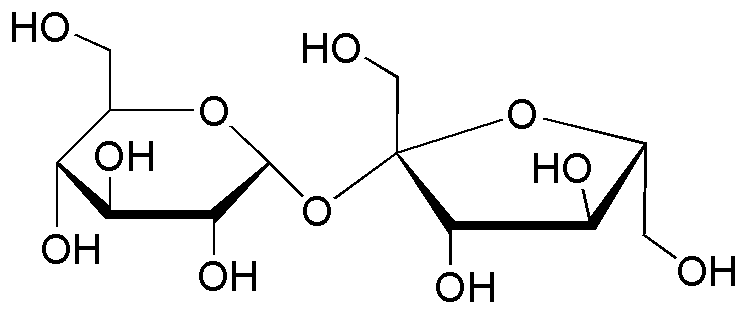Sucrose, Cane Derived is widely utilized in research focused on:
- Food Industry: Sucrose is a primary sweetener in various food products, enhancing flavor and palatability. It is commonly used in baking, beverages, and confectionery, providing a consistent sweetness that consumers expect.
- Pharmaceuticals: In medicine, sucrose serves as a stabilizer and bulking agent in drug formulations. Its ability to enhance taste makes it ideal for pediatric medicines, ensuring better patient compliance.
- Biotechnology: Sucrose is often used in plant tissue culture as a carbon source, promoting growth and development in laboratory settings. This application is crucial for researchers working on plant genetics and breeding.
- Cosmetics: In the cosmetic industry, sucrose acts as a natural exfoliant and humectant, helping to retain moisture in skin care products. This makes it a popular ingredient in scrubs and moisturizers.
- Fermentation Processes: Sucrose is a key substrate in fermentation, utilized in the production of ethanol and other biofuels. Its high fermentability makes it an efficient choice for biofuel production compared to other sugars.
General Information
Properties
Safety and Regulations
Applications
Sucrose, Cane Derived is widely utilized in research focused on:
- Food Industry: Sucrose is a primary sweetener in various food products, enhancing flavor and palatability. It is commonly used in baking, beverages, and confectionery, providing a consistent sweetness that consumers expect.
- Pharmaceuticals: In medicine, sucrose serves as a stabilizer and bulking agent in drug formulations. Its ability to enhance taste makes it ideal for pediatric medicines, ensuring better patient compliance.
- Biotechnology: Sucrose is often used in plant tissue culture as a carbon source, promoting growth and development in laboratory settings. This application is crucial for researchers working on plant genetics and breeding.
- Cosmetics: In the cosmetic industry, sucrose acts as a natural exfoliant and humectant, helping to retain moisture in skin care products. This makes it a popular ingredient in scrubs and moisturizers.
- Fermentation Processes: Sucrose is a key substrate in fermentation, utilized in the production of ethanol and other biofuels. Its high fermentability makes it an efficient choice for biofuel production compared to other sugars.
Documents
Safety Data Sheets (SDS)
The SDS provides comprehensive safety information on handling, storage, and disposal of the product.
Product Specification (PS)
The PS provides a comprehensive breakdown of the product’s properties, including chemical composition, physical state, purity, and storage requirements. It also details acceptable quality ranges and the product's intended applications.
Certificates of Analysis (COA)
Search for Certificates of Analysis (COA) by entering the products Lot Number. Lot and Batch Numbers can be found on a product’s label following the words ‘Lot’ or ‘Batch’.
Numéro de catalogue
Numéro de lot/série
Certificates Of Origin (COO)
This COO confirms the country where the product was manufactured, and also details the materials and components used in it and whether it is derived from natural, synthetic, or other specific sources. This certificate may be required for customs, trade, and regulatory compliance.
Numéro de catalogue
Numéro de lot/série
Safety Data Sheets (SDS)
The SDS provides comprehensive safety information on handling, storage, and disposal of the product.
DownloadProduct Specification (PS)
The PS provides a comprehensive breakdown of the product’s properties, including chemical composition, physical state, purity, and storage requirements. It also details acceptable quality ranges and the product's intended applications.
DownloadCertificates of Analysis (COA)
Search for Certificates of Analysis (COA) by entering the products Lot Number. Lot and Batch Numbers can be found on a product’s label following the words ‘Lot’ or ‘Batch’.
Numéro de catalogue
Numéro de lot/série
Certificates Of Origin (COO)
This COO confirms the country where the product was manufactured, and also details the materials and components used in it and whether it is derived from natural, synthetic, or other specific sources. This certificate may be required for customs, trade, and regulatory compliance.

